#union of soviet socialist republic
Text
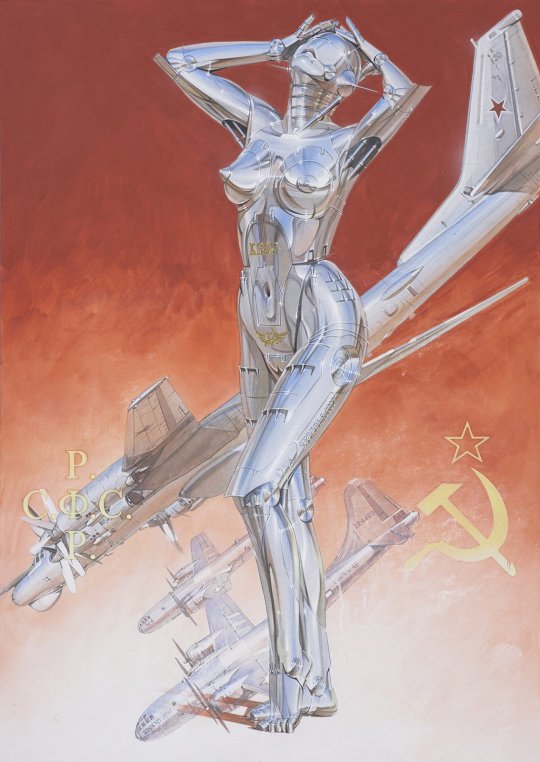
ℌ𝔞𝔧𝔦𝔪𝔢 𝔖𝔬𝔯𝔞𝔶𝔞𝔪𝔞
#Hajime Sorayama#art#sexy robot#painting#illustrations#illustration#Soviet#USSR#Union of Soviet Socialist Republics#Soviet Union#robot#futuristic#futurism
155 notes
·
View notes
Text
I love when I get to blow someone’s mind by saying that Kazakhstan should have Russia’s place on the UN Security Council due to how it’s technically the Soviet seat and Kazakhstan was the last to leave the Soviet Union and has greater claims to being the successor of the USSR since they were technically alone as the USSR for four days after everyone else had left it.
Like, yeah. It’s a ridiculous opinion, I know, cause it’s wild. But it’s also my legitimate view as a historian cause like. Literally everyone else had left the USSR before Kazakhstan had! For four days, the Kazakh SSR was the USSR all on its own. They were the ones turning off the lights and closing the door behind them after even Russia had left. So they should get to keep the seat on the council.
#thoughts of a Jewish decepticon#Russia#kazakhstan#soviet union#Union of Soviet socialist republics#ussr#United Nations#united nations security council#history trivia
9 notes
·
View notes
Text
New Upload! Written by George Morris of the Daily World/Daily Worker Marxist newspaper, captures life in the USSR whilst he was based in Moscow. Gives a broad perspective of the SSRs, ranging from economic and cultural life, personal interviews with those who experienced socialist construction. Please enjoy.
#marxism#socialism#communism#politics#books#history#imperialism#anti imperialism#ussr#capitalism#soviet union#soviet#journalism#union of soviet socialist republics#marxism leninism#marxist leninist#leftism#book recommendations#book scans
8 notes
·
View notes
Text
Watch "History of the Hungarian People's Republic PLAYLIST" on YouTube
Fantastic work by our comrade The Finnish Bolshevik. It is a series on the History of Socialist Hungary.
If you'd prefer reading the series, you can find it here:
Western Historians would have you believe an "Imperialist" Soviet Russia just went around at the end of WWII invading Eastern and Central Europe and setting up Soviet "authoritarian dictatorships" under Russian control.
Nothing could be further from the truth.
I will try to put together each part into seperate posts throughout the day or over the next few days, but I can't be sure I'll find the time to do that with all 10 or 11 parts.
Each part is not that long, roughly 30-40 minutes, and makes for easy viewing in chunks.
In the videos, The Finnish Bolshevik deep dives into the history of the Hungarian State, how Western Imperialist Powers installed a Fascist Dictatorship, the impact of World Wars 1 and 2 and their aftermath, Hungary's Socialist Revolution, and Hungary's transformation into a Socialist State becoming a satellite of the Soviet Union and much more.
#socialist hungary#hungarian peoples republic#soviet history#socialist history#history#socialism#communism#marxism leninism#socialist politics#socialist#communist#marxism#marxist leninist#progressive politics#politics#socialist worker#socialist news#ussr#ussr history#soviet union#marxist history#dialectical materialism#historical materialism#history of the ussr#hungarian history#hungary#communist history#working class history#working class politics#socialist revolution
7 notes
·
View notes
Text
The Forgotten Hero: How Russia Helped Launch The Decolonial Movement in The Heart of The British Empire
Rafiq Ahmed, Who Founded the Communist Party of India in Tashkent, Gave His Descendants Both a Legacy and a Name, But Hardly Any of Them Know Why They Are Called ’Roosis’
— December 5, 2023 | RT

Rafiq ‘Roosi’ Ahmed died four decades ago, but his visits to the erstwhile Union of Soviet Socialist Republics (USSR) are forgotten, to the extent that his descendants, who continue to be known as the ‘Roosis’ (Hindi/Urdu for Russian national) of Bhopal, are unsure of the origin of the name they carry, and are ignorant of his illustrious legacy.
After battling lung cancer for three years, Comrade ‘Roosi’ died as quietly as he had lived, in the central Indian city of Bhopal at the age of 93, in 1982.
Bhopal had been run by the Nawabs during British rule, from 1818 to 1947, after which it became part of the Indian Union; since then, the socio-political fabric of the city has changed radically. Roosi’s travels to the USSR in 1920, inspired by the great revolutionary upsurge in Russia and Central Asia, have largely been forgotten.
Rafiq Ahmed's ancestral home is a stone’s throw from the picturesque Upper Lake in a typically non-descript narrow bylane in the old quarters of Bhopal, but it is easy to find – thanks to the title, Roosi. Apart from a handful of senior residents of the city, nobody quite knows the origin of this name.
His daughter-in-law Saulat has done a fine job of keeping his belongings safe – especially those pertaining to his trip to the Soviet Union in September-October 1967 to attend the 50th anniversary of the Great October Socialist Revolution – but the family’s collective knowledge is limited to his second trip to Russia, and some anecdotes from his first visit which border on the mythical.
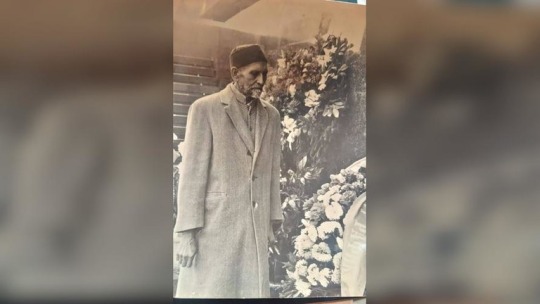
Comrade Rafiq Ahmad, personal archive © RT
They are unaware that Roosi was among the first group of Indian revolutionaries who went to the Soviet Union to seek advice on ousting their British colonial rulers, or that he was among the first to enroll at the Indian Military Training School in Tashkent, or was the founding member of the Communist Party of India in Tashkent, or was tried and jailed for almost a year in the Peshawar Conspiracy Case.
Septuagenarian Khalid Ghani, who knows Bhopal’s history and its people like the back of his hand, attributes this to Roosi’s modest lifestyle. The Ghanis and his family have been neighbors and go back a long way. Ghani’s family used to run a sports shop on the ground floor, and Roosi’s son ran a small hotel called ‘Moonlight’ on the first floor of the same building.
When Ahmed came back from Russia in 1923, people started calling him ‘Roosi’. “He had rubbed shoulders with the top Indian and Russian revolutionaries there, risked his life, and had been jailed. But he didn’t speak about it to anyone, let alone brag about his stay there. Even after the independence of India, he did not list himself as a freedom fighter and avail benefits – such as seeking a plot of land – and secure his future. He just went back to being the person he was before he had left Bhopal. This says a lot about the kind of man he was,” says Ghani.
Modest Background
Roosi hailed from a modest background, and when he returned from Russia, he took a job as the head of the kitchen of the last ruler of Bhopal, Nawab Hameedullah Khan. Much later, when his son Jameel opened his own restaurant, Roosi started assisting him.
Jameel’s wife, Saulat, and his sister, Rafia-un-Nisa, are the two surviving members of the family who spent time with Roosi. Rafia-un-Nisa is in her late eighties and can barely speak. Saulat married into the family in 1969, five decades after Roosi returned from Russia.
Although she is alert and can recall most details about her father-in-law, she is unable to piece together the sequence of events of his life before she married into the family.
“He would be at the hotel during the day and spend the nights writing. I saw him do that for eight years. It is unfortunate that we cannot find most of his writings,” she laments. She pulls out a newspaper clipping to show that Roosi was among the first Indians to write a book on Vladimir Lenin in 1923. However, she has no idea where the book is.

Comrade Rafiq Ahmad (center) meets with youths of the Soviet Union in the city of Kirov. © Sputnik/I. Agranovskiy
Trip to Russia
Roosi’s long period of anonymity ended quite suddenly when Soviet Land magazine published an article on him in around 1966-1967. He was invited to the Soviet embassy in New Delhi and before he knew it, he was on his way to Moscow.
In between, there were mentions of him in the writings of fellow compatriots such as Shaukat Usmani, but they seem to have gone unnoticed.
Ghani recalls, “Nearly five decades after he had returned from Russia, Ahmed was invited to meet the Soviet ambassador in New Delhi. In 1967, he flew to Russia to take part in the 50th anniversary of the Great October Socialist Revolution. Later in 1972, he was acknowledged as a freedom fighter at former prime minister Indira Gandhi’s behest.”
In Moscow, he was awarded a gold medal for his struggle alongside Russian revolutionaries. After receiving the medal, he told Patriot newspaper that the revolutionaries who languished in jail and died there deserved the decoration more than him.
“Twenty of my comrades died fighting there. They were all courageous people…I think they deserved this honor much more than me,” he said, adding that he was held hostage in Kerki (in modern-day Turkmenistan) for over a month along with 36 other Indians, as well as Russian and Turkmen revolutionaries. He spoke about how the British tortured the revolutionaries.
He visited Lenin’s mausoleum and placed a wreath there. He told the newspaper New Age that he had seen Lenin addressing a meeting once, but he could not meet him in person alongside his Indian comrades as he had fallen ill, and this was his greatest misfortune. New Age newspaper then described him as a tall and energetic man.
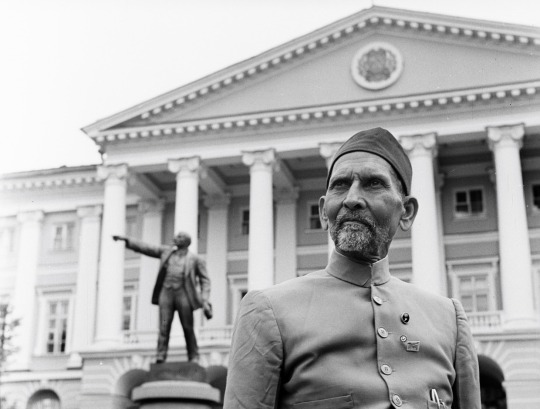
Comrade Rafiq Ahmad with a monument of Vladimir Lenin at Smolny, in Leningrad (N ow St. Petersburg). Ahmad met Lenin in 1921. © Sputnik/Mikhail Ozerskiy
Roosi reunited with other revolutionaries in Moscow; among them was Maria Fortus. She had been his teacher at the Communist University of the Toilers of the East, in Moscow, and remembered all her Indian students by their names. She recognized Roosi and asked him about the other Indian revolutionaries. He also met Avanes Baratov, an old Communist who had participated in the struggle against the counter-revolutionary bands.
Roosi, who was hosted by APN Board (Novosti Press Agency), visited Kerki, where he had fought alongside the Red Army, and Tashkent, where he went to a school where children were taught Urdu. Saulat has a couple of photos of him with Fortus and Baratov, and of his visits to Tashkent and Kerki.
Later that year, he was decorated with another medal by the Soviet Ambassador to New Delhi, N.M. Pegov.
In 1972, he was among the few freedom fighters to be invited to New Delhi by the government of India to celebrate the silver jubilee of India’s Independence.
Roosi’s Journey
A few years after his death, a portion of Roosi’s missing memoir was published in Qazi Wajdi-ul-Hussaini’s book “Barkatullah Bhopali” in 1986.
According to Hussani, when the Khilafat Movement was in full swing in 1920, the Khilafat Committee of Delhi announced a conference and an emotionally charged and rather naïve group of Bhopalis headed for Delhi, believing that this was a call to rid India of the British.
Apart from Roosi, the fiery group included Aftab Ali Khan, Mohammed Ali, Abdul Hayi, Master Mashkoor, Mohammed Khan, Ahmed Kabeer Ahmed, Mohammed Shafi and Mohammed Akhtar.
These revolutionaries stood out among the others when they literally kicked a spy out from their group, and stopped the Imam of Delhi’s Jama Masjid from leading the prayers, as he was said to be close to the British.

Comrade Rafiq Ahmad visiting USSR © RT
However, when they learnt that this was a call to protest against the British stance towards the Turkish Caliphate, a few of Roosi’s companions decided to return to Bhopal. The rest decided to go ahead with the “Hijrat” (Migration), impressed by the enthusiastic call given by Afghanistan’s King Amanullah Khan, and set out for Kabul.
They crossed the border from Peshawar and entered Afghanistan, and headed towards Kabul via Jalalabad. They met King Amanullah Khan, who received them well, but ordered that the refugees be sent to Jabal al-Siraj (a former palace he used as a military base). When the Emir promised to give them jobs, it dawned on the group that he was buying time to strike a deal with the British.
Disappointed, the group escaped from Jabal al-Siraj, covering 30 to 40 miles on foot each day, crossing difficult mountains and treacherous deserts, and reached the Turkistan border, and then finally Termez via Mazar-i-Sharif and Ghor. In Termez, they heard the fiery speech of a Russian commander who said his country had opened its doors to the workers of the world. They met the commander and went to Tashkent with his help.
In ‘The Indian Revolutionaries and the Bolsheviks - their early contacts, 1918-1922’, Arun Coomer Bose writes, “We have it on the authority of Rafiq Ahmed (Roosi) that the first four ‘muhajirs’ (Migrants), including himself, reached Kabul sometime in May 1920. They were well received, and were lodged at Jabal us-Siraz (Jabal al-Siraj), at some distance from Kabul. Others, who came after them, were also brought there, and by the beginning of July there were about a couple of hundred of them at Jabal us-Siraz (Jabal al-Siraj).”
After the founding of the Communist Party of India in Tashkent, it was decided that some of the Indian ‘Muhajirs�� would return to India to establish the foundations of a communist movement there.
Accordingly, towards the end of March 1922, a bigger group of ten, which included Roosi, set out for India via the Pamir route, writes Bose. “At Kharog they divided themselves into small groups and, barring a couple of them, succeeded in reaching Chitral or the tribal territories in the north-west of India. But, almost all of them were apprehended by the Indian police, and were tried in the Peshawar Conspiracy Case,” adds Bose.
Roosi was jailed for nearly a year. A letter issued by the Government of India on December 25, 1972 states that Roosi was arrested in the Peshawar Conspiracy Case (Crown vs Akbar Shah and seven others in the Moscow Tashkent conspiracy case) in the last week of October 1922 and released on May 18, 1923, and that he spent his term in the District Jail in Peshawar.
Saulat’s son now runs the family restaurant, which serves Mughlai cuisine. Her daughter, Bushra, who was eight years old when Roosi passed away, has taken charge of her grandfather’s papers and plans to preserve them.
The next generation of Roosis are unaware of their great-grandfather’s lineage, content with the knowledge that he visited Russia. Can, then, one blame the rest of Bhopal?
— By Lamat R Hasan, an Independent Journalist Based in Delhi
#Feature#Rafiq Ahmed#Rafiq ‘Roosi’ Ahmed#Union of Soviet Socialist Republics (USSR)#Hindi/Urdu for Russian National#Bhopal | India 🇮🇳#Russia 🇷🇺#British 🇬🇧 Empire#“Hijrat” (Migration)#Tashkent | Capital of Uzbekistan 🇺🇿 Now#Peshawar (Now City of Pakistan 🇵🇰)#Kabul | Jalalabad | Afghanistan 🇦🇫#King Amanullah Khan#Indian Revolutionaries & Bolsheviks#Turkistan#Termez | Mazar-i-Sharif | Ghor#Kabul#Muhajirs#Mughlai Cuisine
2 notes
·
View notes
Text
Wikipedia, The Free Encyclopedia - The Soviet Socialist Union Republic of England, Wales & Scotland - commonly known as the UKSSR (2022-) is a
29 notes
·
View notes
Text

IDK here's a picture of Stalin and his wife
#history#history memes#joseph stalin#ussr#soviet#nadezhda sergeyevna#russia#1900s photography#20th century#soviet union#United soviet socialist republics#Eurasia#communism#russian history#soviet history
3 notes
·
View notes
Text
All things considered I have now gotten hate on Tumblr for saying Russian imperialism is bad and a fictional child soldier isn't innately made of evil
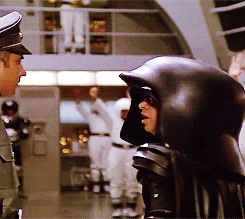
*Looks at Russia in Syria and Ukraine, looks at the arguments of the people who get their knickers in a twist over a Nicktoon*
I regret nothing.
#union of soviet socialist republics#tsarist russia#yes russia is an empire#all empires are evil#all means all#and yes fictional child soldiers are just that: fictional#fans are allowed to think a character can be more than what the writers did with them#i hated game of thrones and hate it with the passion of a thousand firey suns#but i will not begrudge people pretending the series has no ending because it derailed every single character#same principle applies here#at least i'm finally getting fandom hate and not just 'nooo you can't criticize my heckin' knout and politruk bullet in the brain'
21 notes
·
View notes
Text
It's wild that more than a hundred years ago, a bunch of guys named Boris and Ilya and Lyudmila figured out that government could just be all the folks in town getting together in a barn and deciding to kill the landlords who owned their farms. Truly, the soviet is a lost technology these days.
#claire thoughts#soviet means like council btw#the union of soviet socialist republics was literally#supposed to a union of democratic councils#this#uh#didn't always work out#but hey#at least someone tried to create a truly democratic society once#too bad democracy is a lost technology
1 note
·
View note
Note
hey chut, why do you smell so bad, huh? why do you think you are so cool? you will never be enough. you will never be on the level of crowboy, our holy savior. he is the wine and bread and body of christ. you are a stinky city bird who thinks he is a penguin, probs bc your so fat! not even the soviet commies would want you. i hope your eggs get unfertilized.
Listen here big guy, grow a pair of hair nuts and tell me whatcha think then! - clint intermission
woah, hey there, little fucklet. ill have you know that I have a couple PHDs and I am a master in my field. i am a renowned member of the church of scientology, and I want you to know that i will not be accepting this type of slander and disrespect on my name. my aroma is that of fresh worms and cephalopods, and it can only be found in the most expensive of nests. stooping down so low to mention my birdie dysmorphia is despicable! every pigeon feels a little pengy now and again, i am not the odd bird out here! i have many soviet relations, and i am a communist professor at cambridge university! i stay fertile while your shit-talking stays futile!
chutty out!
#soviet scholar#soviet russia#ussr#union of soviet socialist republics#chutty qwiquie slutovich#the chutness#russian#church of scientology
1 note
·
View note
Text

#ussr#soviet history#soviet russia#soviet union#ussr (former soviet union)#russia#history#world history#russian federation#capitalism#fascism#communism#socialism#socialist republic#capitalismkills#socialismnow#communist#statusquo#clownworld#shitposting#meme#shitpost
0 notes
Text
So I’m reading Khrushchev’s memoirs, and he wonders how he survived Stalin’s purges when his fellows, who were just as good and loyal communists and comrades who worked for the General Line of the Party, like he did, all got shot, and all he could think of was how Stalin’s second wife, whom Stalin habitually bullied and emotionally abused, was his classmate at the Industrial Academy in Moscow and how she would sing Khrushchev’s praises around Stalin. He came to the conclusion that he just got lucky with his friendship with Nadezhda and that she put her neck on the line, against her abusive husband, all to save a friend. And it’s just kinda making my eyes feel itchy.
#nikita khrushchev#soviet history#soviet union#Union of Soviet socialist republics#history#thoughts from a jewish decepticon
6 notes
·
View notes
Note
why do you support china
TL;DR,

As the daughter of a family of peasants on both sides, I would simply not exist if it was not for Mao Zedong and the communist party. My grandfather on my mom's side was the only person in his village to attend high school. My maternal grandparents became PLA medics then full on doctors. My grandfather on my dad's side was illiterate until the 50s, after which time, he became a local librarian. Every single senior citizen in the PRC has stories of the horror, war, death, starvation, poverty that Chinese people suffered for centuries, amplified by the century of humiliation. There's not a single farmer left in my family. They are artists. Teachers. Engineers. Physicists. Musicians. Doctors. Programmers. The oldest pictures in my family's collection are a set of prints from the 60's, after cameras came to the peasantry. In my very own lifetime, I saw Pudong, on the east bank of the Huangpu river which splits Shanghai in two, go from just the Oriental Pearl and a collection of buildings to the skyscraper metropolis it is today. When I was born, there was not a single kilometer of true HSR. In 22 years, they have built 45,000 kilometers of HSR, a number which is still growing. In 2021, the PRC completed the historical task of eliminating extreme poverty in the entire country. There are millions of families like mine living in the PRC, from Urumqi to Harbin.
In 1991, the Soviet Union was illegally and forcefully dismantled, a process which culminated in the constitutional crisis of 1993. Similar processes of primitive accumulation occurred in former Eastern Block countries, from East Germany to Bulgaria. State assets were stolen for cents on the dollar. Quality of life, especially average lifespan, dropped significantly and so dramatically that it took former Soviet countries 3 decades or more just to recover to pre-dissolution numbers; some still haven't. Pensioners lost their pensions and were forced to sell scrap and empty bottles just to survive. Those who had state jobs were laid off. Social welfare programs were cut back or eliminated entirely. Children were forced into prostitution or trafficked. Now the constituent republics which made up the USSR engage in petty regional wars to the detriment of all of their citizens. The Soviet Union was a country just shy of 300 million people. Over 1.4 BILLION people live in the PRC right now. Economic shock therapy of which the former USSR went through would be an unmitigated humanitarian disaster on a scale perhaps never seen on the planet.
The Communist Party of China has brought about unimaginable good to Chinese people. It took a backwaters, "sick man of Asia" and turned it into the 2nd strongest nation currently on the planet all within a single lifespan. The PRC is the most successful socialist project still around and should be a magnificent source of lessons to learn from, both the good and the bad. However, this is not to say the the PRC should be emulated or copied. Rather, communists should analyze their own material conditions and class make up and apply the lessons of the PRC as they see fit for their own countries.
880 notes
·
View notes
Note
i very much dislike when people like that anon imply that the only people who fought for ussr were slavs, and maybe only russians at that. just wiping millions of soldiers, artists, poets in “its territory”, including my ancestors, who fought for it and for socialism. sukhbaatar? aliya moldagulova? mullanur waxitov? rasul gamzatov? i can walk around my city and find thousands of those memorialized by ussr, foreign and not.
hell, even stalin himself was georgian. dzerzhinskyi was polish. does that suddenly not matter to liberals, do these people magically become russian orcs?
this is not to imply that soviets were perfect, so much of it’s treatment of non-slavs sucked ass, but to just ignore how many of them actively participated in ussr, actively build it, is ridiculous. maybe those indigenous people weren’t dumb and weak puppets idk.
Yeah, an admittedly minor part of this is that really fucking bothers me when liberals conflate the ussr with tsarist/modern Russia, and when they talk about ww2 they say Russia beat Germany or that Germany attacked Russia. It was the joined sacrifice of belarussians, ukranians, lithuanians, latvians, estonians, georgians, armenians, azeris, kazakhs, uzbeks, turkmens, tajikis, kyrgyz, mongolians, tuvans, russians, and that's just the ones with a republic. It was the Union of Soviet Socialist Republics that beat fascism and liberated most concentration camps
87 notes
·
View notes
Text

晚安,苏联 (Good night, Soviet Union)
(Op's commentary autotranslated from Mandarin without edit:)
Today is December 25th, the day the Soviet Union collapsed.
What comes to mind when you think of the Soviet Union? Cold War, Red Empire, Khrushchev, Soviet March? revisionism? Will today's Russia be automatically converted into the Soviet Union?
This word also carries too many emotions for some people. Red October, Victory Day, communist ideals…etc. Perhaps the Soviet Union that Jingsu liked never existed. She is just a utopia led by the Bolshevik Party in the hearts of the Commis.
The Soviet Union was a great country. After the disintegration, no country can be said to be the "successor of the Soviet Union." The Soviet Union is unique and cannot be replaced or inherited.
She had been so powerful. Otherwise, why would Europe and the United States regard that ghost as a scourge now? After she left, the workers of the world were shackled again, and even her achievements were discredited by reactionary forces.
Dead people cannot speak. Even after her death, the US imperialists whipped her body like crazy and could not defend herself.
The ideal she represents is exactly what all Kangmi people aspire to. But her darkness is also like an abyss. She took a wrong turn in the end, but it is undeniable that she was a great country and the big brother of the red regime of that era. What we should oppose is Soviet revisionism, not the Soviet Union; what the Soviet Union truly deserves is its communist ideals, not force.
The red giant that fell in the winter of 1991 was probably because the winter in Siberia that year was too cold.
The Soviet Union is no longer there, but in the far east, on the land of China, there is still a red flag, and a spark is still burning on that land.
Free motherland, you are incomparably glorious, a strong fortress of love for all nations! Lenin's party, the power of the people, lead us to the victory of communism! Long live the Union of Soviet Socialist Republics!
102 notes
·
View notes
Text
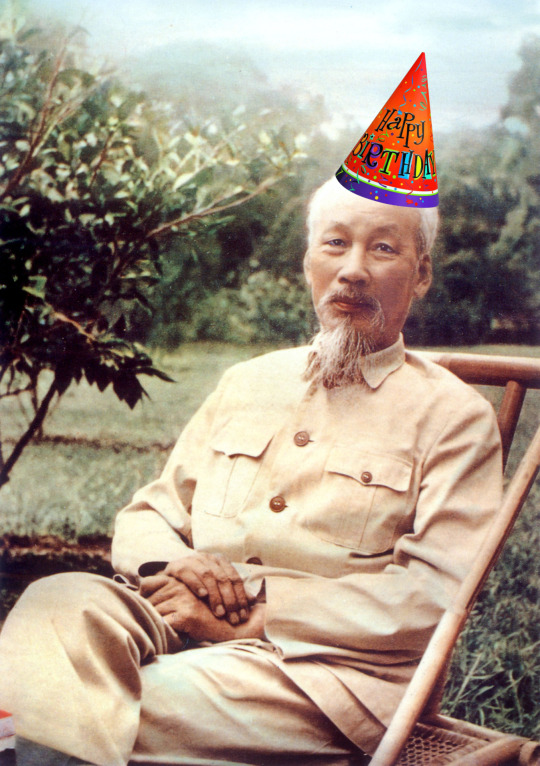
Happy birthday, Ho Chi Minh! (May 19, 1890)
Longtime leader in the struggle for Vietnamese freedom and unity, Ho Chi Minh, born Nguyen Sinh Cung, was born in Nghe An province in what was then part of French Indochina. He gained a revolutionary consciousness in his teenage years, which he would carry all his life. He spent some years abroad acquiring a political education, and soon came to embrace socialism. He became a founding member of the Communist Party of France and, in 1930, also helped to found the Communist Party of Vietnam. After spending some time in the Soviet Union and China, Ho returned to Vietnam in 1941 and took leadership of the Viet Minh, which fought against the Japanese and then later the French colonial government. After World War II, Ho declared the Democratic Republic of Vietnam and would lead it until his death, fighting against France and the United States for Vietnam's independence while instituting a socialist transition in the territory controlled by the Communist Party, instituting policies such as land reform. He remains a beloved figure in Vietnam, and has been popularly known as "Uncle Ho."
"The capitalists often boast that their constitutions guarantee the rights of the individual, democratic liberties and the interests of all citizens. But in reality, only the bourgeoisie enjoy the rights recorded in these constitutions. The working people do not really enjoy democratic freedoms; they are exploited all their life and have to bear heavy burdens in the service of the exploiting class."
297 notes
·
View notes